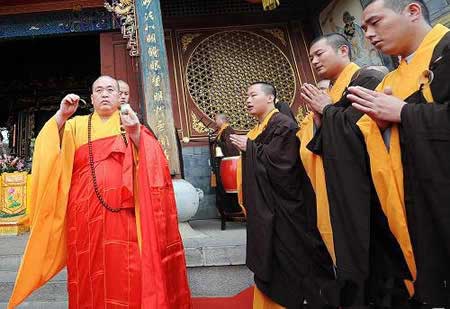"Enjoying" multiple roles
Shi was born in 1965 as Liu Yingcheng in Yingshang County, Anhui Province, and entered the monastic life at the age of 16. He formally took office as abbot in 1999 after completing his education at various Buddhist colleges.
He is now chairman of the Henan Province Buddhists Association, vice chairman of the Buddhist Association of China and a deputy to the Ninth National People's Congress.
With so many official titles, Shi has been bombarded for allegedly accepting a variety of luxury gifts, including an iPad, an iPhone, a Volkswagen SUV worth about 1 million yuan in 2009 and a special robe worth about 160,000 yuan in 2006.
At this, Shi argued during an interview with Jamil Anderlini, a reporter from the Financial Times, that "the Volkswagen is worth less than 1 million yuan and was given to me by the local government because we have brought them a lot of profits. We attract many visitors and students, so the government awarded me a car to encourage me to do a better job."
The robe came from the director of the Nanjing Brocade Research Institute, Shi added, but "I never wore it and am planning to store it in the upcoming museum of the Shaolin Temple for later generations."
He also explained that the iPad and other gadgets were all gifts from devotees, but that he will not use them until the old ones are broken and unusable.
Monk or CEO?
Shaolin Temple is a UNESCO world heritage site located at Mount Song in Dengfeng. Famous for its kung fu, the temple has been teaching martial arts to monks for centuries to uphold social justice and cultivate their minds.
Nowadays, it is a popular place of interest which receives thousands of tourists, foreign and Chinese, every day, who, according to Anderlini, come to wander the temple grounds and watch incredible displays of strength and acrobatic kung fu performed by world-famous fighting monks.
The success, however, should largely be attributed to Shi, who has dedicated himself to the monastery's restoration and revival.
Speaking of the profits earned by the temple, Shi disclosed that the local government has taken charge of all revenue, 30% of which (about 40 million yuan per year) goes to Shaolin.
"About 70% of the revenue is applied to construction and repairs, 20% to daily expenditures by the monks and 10% to charity," Shi noted. "Since the 1980s, we have only received 5.9 million yuan for the repair of cultural relics. Hundreds of millions of yuan for other repairs was raised by us alone."
Accused of having about $3 billion in an American bank account, Shi denied that he is paid 700 yuan monthly as a salary and that most of his income is donations from devotees.
"Most of the donations have been used to renovate branches of Shaolin Temple," added Shi. "Sometimes I dig into my own pocket for expenses on overseas studies by our disciples."
"We don't have much savings in the bank, but there is a lot of grain stored in the barn, enough for two years, so if there is a disaster, Shaolin Temple could hold out for two years or so," he told Anderlini.
Shi has also been criticized for his method of charging fees for admission and burning incense. Furthermore, in order to help the temple become listed as a UNESCO world heritage site, Shi was condemned for his approval of nearby demolition in 2001, reported the Shanghai Daily.
According to data from Shi's entry on Wikipedia, in November 2009 the official Shaolin Temple website was hacked twice. The first time, the message "Shaolin evildoer Shi Yongxin, go to Hell" was posted in Chinese calligraphy. The second time, hackers posted a letter allegedly written by Yongxin, in which he apologized for living a materialistic lifestyle and commercializing the temple.
At this, Shi argued that commercialization is just a modern tool to promote and spread traditional Shaolin culture and martial arts, and will be good for the temple in the end.
"Commercialization or industrialization, whatever term you use, is a path leading up to the truth of Zen. My vision is that Shaolin will eventually become a way to consolidate Chinese confidence and wisdom," he told the People's Daily.
"Our aim is to promote Buddhist culture, to baptize human souls and purify minds," he added in the interview with Anderlini. "What we have done so far [in terms of commercialization] is actually quite conservative, because we don't want to get too mixed up in the affairs of society or over-exploit Shaolin Temple."


















